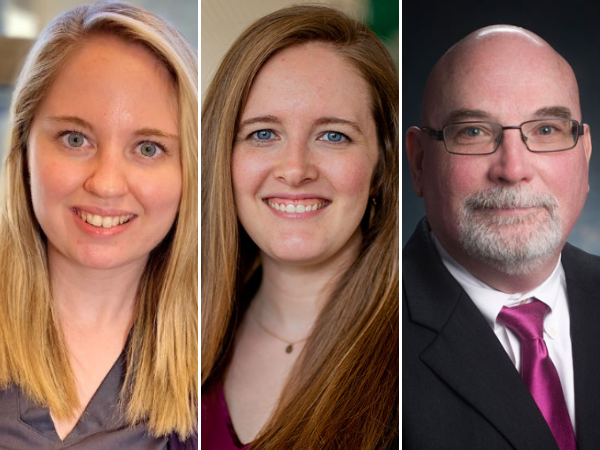UAB Eye Care, the UAB School of Optometry's clinical arm, has expanded its low vision services in response to the expected increased demand for low vision services. The clinic is one of few in Alabama to offer a telemedicine option to low vision patients who cannot travel or are located in rural areas.
“Public health experts predict a rise in visual impairment globally because of an aging population,” said Terri Call, OD. “This trend will increase the demand for low vision services. This expansion will allow us to meet growing demand.”
Each with expertise in the area, Call, Crystal Maharrey, OD, and Mark Swanson, OD, are the low vision providers at UAB Eye Care.
Low vision services, a specialized niche in the eye care of patients with vision impairment, can be difficult to find. The care involves helping patients maximize their remaining vision with devices and training that are specific to their disorder, and is provided by an optometrist with low vision training. Patients also often benefit from referrals for occupational therapy specializing in visual impairment and additional services such as home modifications or orientation and mobility training.
Telemedicine care is a unique addition to the low vision services at UAB Eye Care. Virtual evaluations and virtual device training sessions increase the availability of care to patients who are unable to travel and can enhance the optometrist’s ability to assist the patient with environment-based challenges such as lighting and physical space considerations.
According to Maharrey, visual impairment imposes an exceptional challenge for patients in rural areas in that public transportation is likely not an option, and alternative means of travel may be difficult to obtain. Internet connectivity can be an additional barrier. To serve this population of people and many others, we are excited to offer this expansion of services, including doctor-recommended low vision kits that are shipped to the patient.
“We are well-equipped to care for patients that are unable to travel,” Maharrey said. “This is one of the primary goals of our telemedicine services.”
Virtual low vision evaluations occur in two phases for most patients. The first evaluation assesses the patient’s visual goals and needs using clinic-provided kits for at-home evaluation and device orientation. The kit contains a tablet and/or cell phone that have data connections for the patient to connect with the doctor. The kit also includes all that is needed to obtain information about a patient’s visual function. Before the follow-up visit, the patient receives an additional kit with doctor-recommend low vision devices to try. The patient is trained to use the selected devices during the virtual visit and keeps the most useful devices. In-person visits are incorporated at any time where needed or preferred.
UAB Eye Care has been a provider of low vision services for decades and has a strong partnership with the UAB Center for Low Vision Rehabilitation (CLVR), located next door. A joint endeavor between the Departments of Optometry and Ophthalmology in the early 2000s, the CLVR is a space dedicated to advanced low vision care and has welcomed optometry interns since its inception. UAB Eye Care’s low vision services have since remained a primary low vision option for appropriate patients, with meaningful collaboration from the CLVR for both education and patient care.
Adding telemedicine capabilities opens the door for patients who will benefit, and exposes optometry students to the technology.
CLVR Director and co-founder, Dawn DeCarlo, OD, PhD, MS, MSPH, said, “I enjoy having the optometry students on rotation in the Center for Low Vision Rehabilitation and am very supportive of this new opportunity for them to provide care to patients with low vision at UAB Eye Care, thereby increasing the availability of care and the number of providers prepared to deliver this specialized care on graduation.”
Because UAB Eye Care is a teaching clinic, there is expanded clinic access and appointment availability for both in-person and virtual visits. Patients should call 205-934-3086 to schedule an appointment for a low vision evaluation.
